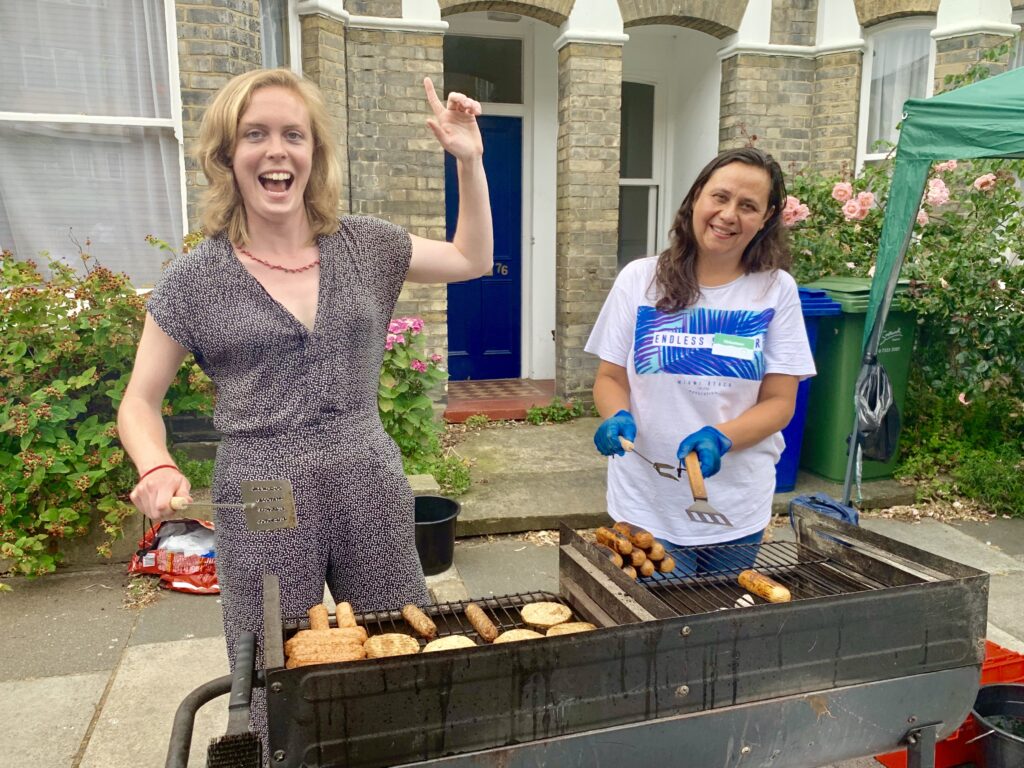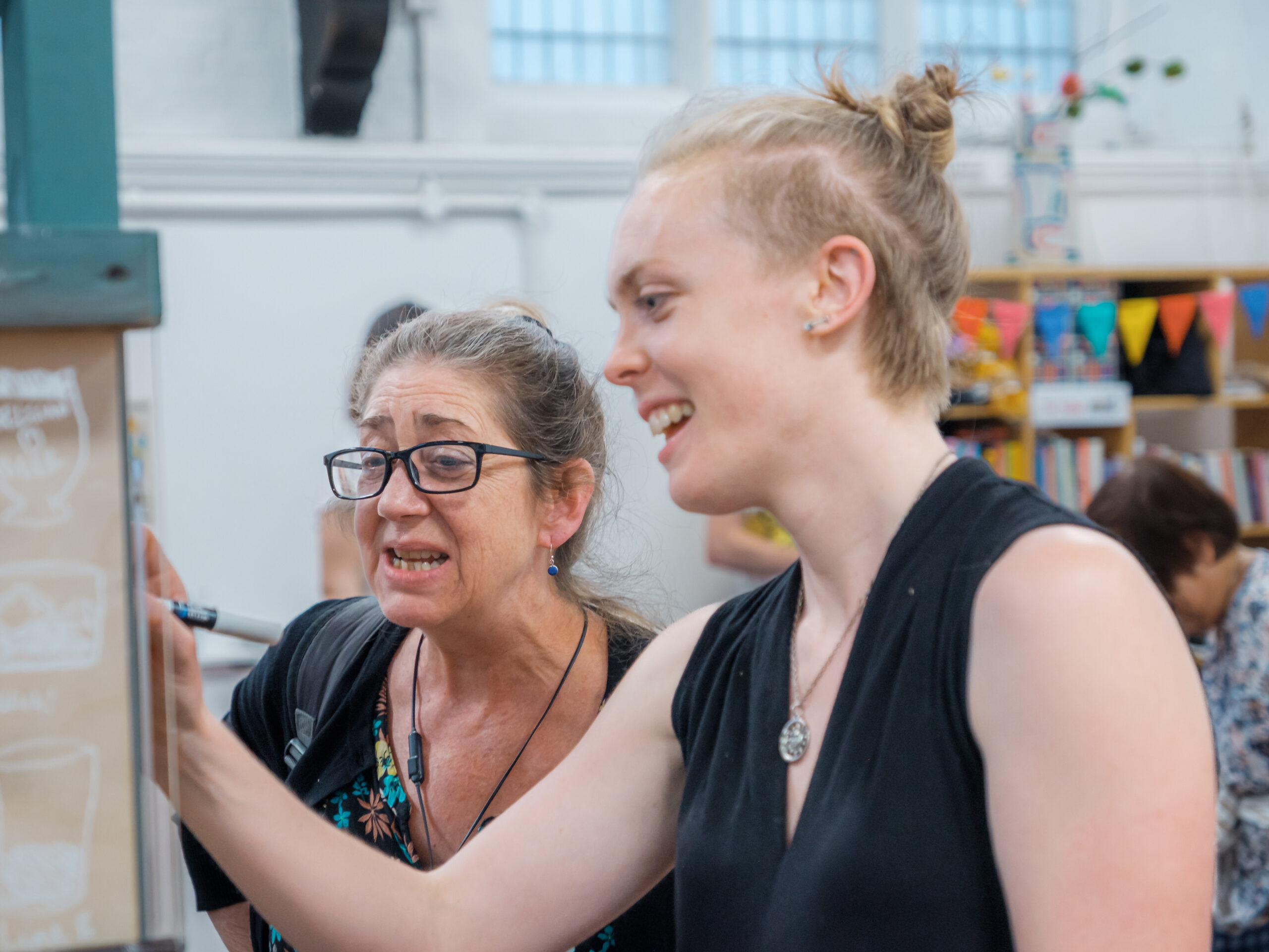This month we’re delighted to feature Frances Foley, a former resident at Pembroke House, who is now also our neighbour! Frances sat down with Juliette, our Pembroke Trainee, to talk all things settlement and residency.
Juliette: How did you find out about Pembroke House?
Frances: Through a friend of mine who suggested meeting with Mike (Pembroke House’s Executive Director). I remember meeting him in the garden and just loving the space immediately and wanting to find a way to be part of it.
We had an incredible lunch with Migrateful, which was run by a resident at the time. Later, Mike laid out the whole history of settlements and I was really intrigued and surprised that I had never heard about it! It’s such an interesting radical history with a lot of questions and complexities.
J: How did it feel living in the residency?
F: I felt at the heart of something that was kind of alive. It was great to be in a place that was really used, with people coming in and out. You felt like you were looking after the space. It is your home, but it’s not just your private property.
There’s something about the history of it as well- the fact that people continuously lived in it for, when I was living here, 135 years. It was kind of mind blowing, people have just been in here all the time. So I had this sense that it’s mine when I’m living there or it is my home, but I also shared it with all these people who’ve gone before.
J: One of the conditions of the residency was to volunteer five hours a week. What were you involved in when you first moved in?
F: I love running participatory events that engage people and have a lot of experience doing so for work. At the time Pembroke House was looking for someone to take over the main events of the year, so I started organising events like the festival reception and the street party. I ran the first one in 2019 as a resident and then the second one in 2021 when I’d already moved a couple of doors down.
We all also just pitched in with different things. I helped out with the Walworth Living Room as it was being set up and other times at Lunch Club. I also set up the Force Learning Group- a reading group to learn more about settlement history. Every fortnight we would meet after work for a couple of hours to discuss select readings – for example on how the community responds to a crisis and examples from around the world about community resilience.

J: What is your relation to Pembroke House now or how would you describe it?
F: I feel a real affinity and love for Pembroke House. It was sad to go from a place of feeling really at the heart of things to quite disconnected, because I’d really like to get to know more people.
Still, I’m really excited about the Residency project. I felt really sad when the residency paused. I’m still here and a lot of the other residents still care a lot about it. It’s nice for people to have connections in their neighbourhood and to know their neighbours. That’s what sets Pembroke House apart from other community centres- that some people do live on site and that still feels quite special.
J: Pembroke House has now existed for 140 years. What do you think is its role in the neighbourhood today?
F: It’s an anchor that has existed for such a long time and so brings a different perspective than other organisations which are newer.
Pembroke House also has a way of working that’s not just about delivering services, but also about how to encourage people’s participation. The fact that it has a physical presence and sites is really important especially nowadays, with the loss of a lot of community spaces, and since the pandemic, a lot of things being digital. It’s so important to have these buildings and spaces for people to be together. I think that is very precious and we should hold on to it.
J: Lastly, what are your hopes for the future of the neighbourhood?
F: I really hope that Walworth will still be a place where people can spend their whole lives if they wanted to. And that people who’ve just moved to London, or to the UK, also feel like they have a home and a place where they feel welcomed. That’s the thing that keeps a neighbourhood going- there are some people who’ve lived here all their lives and others that have just arrived.
That’s why I think Pembroke House is so precious because London can feel very disorientating and things change so quickly, and so how do you feel a sense of continuity? Pembroke House is still here, it’s still doing the thing it’s always done and that’s what I kind of hope for the neighbourhood.
You can delve deeper by reading France’s article in The Plough, where she eloquently unpacks the relevance of settlements today.
As part of our 140th year celebrations, we’ll soon be kickstarting a project that delves into the rich history of Pembroke House’s residency. We’ll be reconnecting with former residents like Frances, and the stories and relationships that make up this rich history. Were you involved in our residency or know someone who was? If so, we would love to hear from you! Please get in touch with us here.
